IACC Full Committee Meeting (Virtual)
 Event Information
Event Information
| Topic | Topic Description |
|---|---|
| Date: | Tuesday, April 4, 2023 |
| Time: | 10:00 a.m. to 5:00 p.m. ET |
| Cost: | The event is free and open to the public. |
| Access: | This was a virtual event and the video will be posted soon. |
| Public Comments: | The IACC welcomes public comment from members of the autism community. Please review IACC's "Spirit of Collaboration," public comment guidelines, and full instructions prior to submitting your comment. The deadline for submission of comments for the April IACC meeting is Wednesday, March 22, 2023. |
| Disability Accommodations: | Captioning will be available. Individuals who need sign language interpreters and/or other reasonable accommodations to participate in this event may contact Rebecca Martin at Rebecca.martin@nih.gov or 301-435-0886. Please make accommodation requests 7 business days prior to the event. The event is recommended for ages 13 and up. |
 Agenda
Agenda
| Time | Event | ||||||||
|---|---|---|---|---|---|---|---|---|---|
| 10:00 a.m. | |||||||||
| 10:15 | |||||||||
| 11:15 |
Break
|
||||||||
| 11:20 | |||||||||
| 11:35 | |||||||||
| 12:20 p.m. |
Lunch Break
|
||||||||
| 1:00 |
|
||||||||
| 1:50 |
Break
|
||||||||
| 2:00 |
|
||||||||
| 4:30 |
Break
|
||||||||
| 4:35 |
Round Robin Updates
|
||||||||
| 4:55 |
Schedule is subject to change. For more information on upcoming events, please see https://iacc.hhs.gov/meetings/iacc-meetings/
Next IACC Full Committee Meeting:
Wednesday, October 11, 2023, 10:00 a.m. - 5:00 p.m. (Hybrid or Virtual)
- April Meeting Minutes (PDF 392 KB)
 Speakers
Speakers
Karyl Rattay, M.D., M.S., FAAP
Director, Division of Human Development and Disability, Centers for Disease Control and Prevention
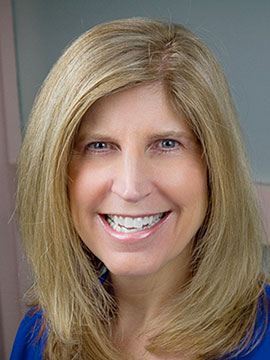
Dr. Karyl Rattay is the director of the Division of Human Development and Disability at the Centers for Disease Control and Prevention (CDC). Prior to joining CDC, Dr. Rattay served for 13 years as Delaware's Director of the Division of Public Health. During this time, she established the Healthy Communities Delaware initiative in collaboration with the University of Delaware and Delaware Community Foundation. Dr. Rattay has also served as a Senior Policy and Program Analyst for five years with the Nemours Health and Preventive Services. She helped establish a new division focused on health promotion and prevention for the children and youth of Delaware. Additionally, she served in the U.S. Department of Health and Human Services (HHS) Office of the Secretary Office of Public Health and Science, where she worked with the Assistant Secretary of Health and the Surgeon General on issues related to overweight/obesity, physical activity, nutrition, child health, and clinical health. She was the Co-Executive Secretary of the 2005 Dietary Guidelines for Americans and supported the Surgeon General and Secretary in writing the Surgeon General's Call to Action to Prevent and Decrease Overweight and Obesity.
Matthew Maenner, Ph.D.
Chief, Child Development and Disability Branch, Division of Human Development and Disability, National Center on Birth Defects and Developmental Disabilities, Centers for Disease Control and Prevention
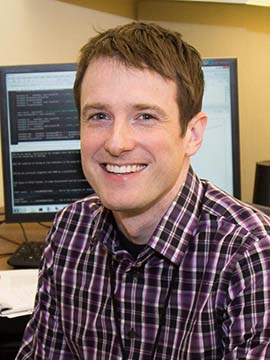
Dr. Matthew Maenner is an epidemiologist and Chief of the Child Development and Disability Branch at the National Center on Birth Defects and Developmental Disabilities. He leads CDC's Autism and Developmental Disabilities Monitoring Network, which currently tracks the prevalence of autism among children, progress in early identification, and needs of adolescents in multiple U.S. communities. Dr. Maenner received the Presidential Early Career Award in Science and Engineering for advancing developmental disabilities research and surveillance. He joined CDC in 2013 as an Epidemic Intelligence Service Officer assigned to the Developmental Disabilities Branch. He received his Ph.D. in Population Health at the University of Wisconsin and completed a postdoctoral fellowship at the Waisman Center, University of Wisconsin-Madison, focused on intellectual and developmental disabilities research.
Kelly Shaw, Ph.D.
Acting Team Lead, Surveillance Team, Child Development and Disability Branch, Centers for Disease Control and Prevention
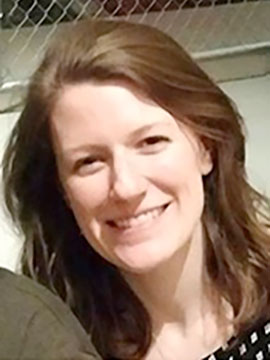
Dr. Kelly Shaw is Acting Team Lead of the Surveillance Team in the Child Development and Disability Branch at CDC. The team oversees the Autism and Developmental Disabilities Monitoring (ADDM) Network. in Genetics and Molecular Biology from Emory University and started at CDC in 2017 as an Epidemic Intelligence Service Officer assigned to the Virginia Department of Health. Her current work focuses on progress and disparities in early identification of autism. She started at CDC in 2017 as an Epidemic Intelligence Service Officer assigned to the Virginia Department of Health. Dr. Shaw received her Ph.D. in Genetics and Molecular Biology from Emory University.
Brian Boyd, Ph.D.
Interim Director, Frank Porter Graham Child Development Institute; William C. Friday Distinguished Professor, School of Education; University of North Carolina at Chapel Hill

Dr. Brian Boyd is Interim Director of the Frank Porter Graham Child Development Institute and the William C. Friday Distinguished Professor in Education at the University of North Carolina at Chapel Hill. He was previously the Director of the Juniper Gardens Children's Project at the University of Kansas. As a special educator by training, much of his research has involved the development and evaluation of evidence-based practices that could be implemented within school and home contexts. Dr. Boyd's research has been continuously funded by federal agencies such as the Institute of Education Sciences and National Institutes of Health. Currently, he serves as Vice President of the International Society for Autism Research and Co-Editor of the Journal of Early Intervention.
Jill Locke, Ph.D.
Co-Director, School Mental Health Assessment Research and Training (SMART) Center; Associate Professor, Department of Psychiatry and Behavioral Sciences, University of Washington
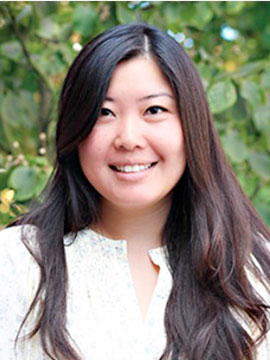
Dr. Jill Locke is an Associate Professor in the University of Washington Department of Psychiatry and Behavioral Sciences, Co-Director of the School Mental Health Assessment Research and Training (SMART) Center, and a licensed child psychologist. To date, her research has focused on the: 1) presentation of social impairment for autistic youth; 2) identification of best practices for autistic youth; and 3) understanding of successful implementation and sustainment of evidence-based practices (EBPs) for autistic youth in public school settings. Her current research focuses on understanding EBP use to support autistic youth and developing and testing implementation strategies to support the adoption, implementation, and sustainment of EBPs in public schools.
Camille Proctor
Founder, The Color of Autism Foundation; Founding Member, National African American Autism Community Network
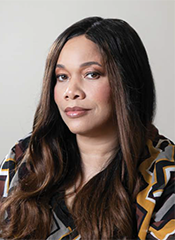
Ms. Camille Proctor founded the Color of Autism Foundation after discovering the need for support for African American families with children on the autism spectrum when her son received his diagnosis. The foundation works to raise awareness about autism and ensure that all people with autism receive appropriate and effective services and support. She is a founding member of the National African American Autism Community Network (NAAACN), which is a nationwide coalition of organizations who aim to support and educate African American families affected by autism.
Gyasi Burks-Abbott, M.S.
Faculty, LEND Program, Boston Children's Hospital, University of Massachusetts Boston's Institute for Community Inclusion
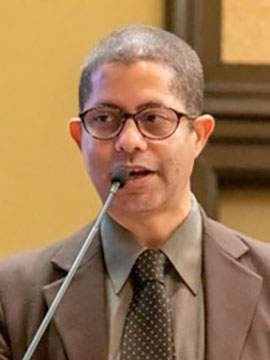
Mr. Gyasi Burks-Abbott is on the faculty of the LEND (Leadership Education in Neurodevelopmental and related Disabilities) Program at Boston Children's Hospital and UMass Boston's Institute for Community Inclusion. Currently, Mr. Burks-Abbott serves on the boards and committees of several autism and disability organizations including the Autism Subcommittee of the American Academy of Pediatrics, the Strategic Planning Committee of the Autism Society of America, the Massachusetts Developmental Disabilities Council, and the Massachusetts Permanent Commission on the Status of Persons with Disabilities. He's contributed to and written articles for such publications as the Autism in Adulthood Journal, Autism Spectrum News, and the Developmental Disabilities Network Journal. Mr. Burks-Abbott tells the story of how he became an autism self-advocate in his autobiography/memoir called My Mother's Apprentice: An Autistic's Rites of Passage. He lives in Bedford, Massachusetts. He graduated from Macalester College in St. Paul, Minnesota with a B.A. in English and psychology, and he has an M.S. in Library and Information Science from Simmons University in Boston.
Crystal Hernandez, Psy.D., M.B.A.
Executive Director, Tulsa Center for Behavioral Health
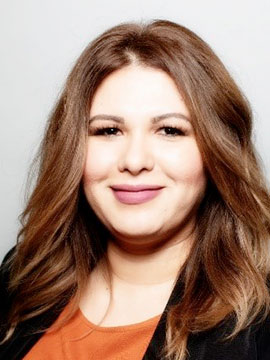
Dr. Crystal Hernandez is a psychologist by training and has been a mental health administrator for over 15 years. Currently, she serves the State of Oklahoma as the Executive Director of the Tulsa Center for Behavioral Health, which is an adult civil psychiatric hospital. She also serves the Oklahoma Forensic Center, which is the sole forensic psychiatric hospital for adjudicative competency and insanity, and the Transitions Recovery Center, which is a forensic mental health step-down unit. Dr. Hernandez is considered a Tribal disabilities expert, as well as a researcher, autism mother, and ally. She holds independent contracts with several Tribal Nations to provide guidance and insight to system and program development and design. She serves on the board of the Arc of Oklahoma and the Autism Foundation of Oklahoma. She is a Program Advisory Committee member for the State of the States in Intellectual and Developmental Disabilities and is a State of Oklahoma Joint Arbitration hearing officer. She believes in service to others and works relentlessly to improve clinical treatments, diagnosis, and equitable access to care for all. Dr. Hernandez serves as a Tribal mentor parent to those walking their autism journey and participates in state and federal projects. She is the creator and co-host of the Black Feathers podcast- Tribal Disabilities conversations for all rooted in traditional storytelling and data.
Lydia X. Z. Brown, J.D.
Director of Public Policy, National Disability Institute
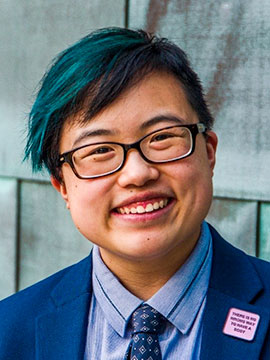
Lydia X. Z. Brown is the Director of Public Policy at the National Disability Institute, which works to advance economic opportunity and freedom for people with disabilities. Lydia Brown teaches at Georgetown University, holding faculty appointments in Disability Studies and the Leadership Education in Neurodevelopmental Disabilities Fellowship Program at the Georgetown University Center for Excellence in Developmental Disabilities. Lydia Brown currently serves as Co-President of the Disability Rights Bar Association, member of the National Executive Committee of the National Lawyers Guild, and founding board member of the Alliance for Self-Direction and Disability Rights. Lydia Brown holds a bachelor's degree in Arabic from Georgetown University, and a J.D. with joint concentrations in Criminal Law and Justice and in International Law and Human Rights from Northeastern University School of Law.
Sandy Magaña, Ph.D., M.S.W.
Professorship in Autism and Neurodevelopmental Disabilities, Steve Hicks School of Social Work, University of Texas at Austin; Director, Texas Center for Disability Studies; Director, ACT LEND program
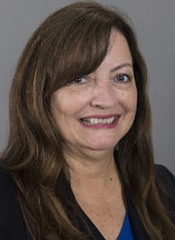
Dr. Sandy Magaña holds the Professorship in Autism and Neurodevelopmental Disabilities in the Steve Hicks School of Social Work at the University of Texas at Austin and is the Director of the Texas Center for Disability Studies and the Autism Consortium of Texas (ACT) LEND program. Her current research includes investigating disparities among children with autism and developmental disabilities and developing interventions to address these disparities. Previously, she was a faculty member in the UW-Madison School of Social Work for 12 years and later served as a Professor at the Department of Disability and Human Development at the University of Illinois at Chicago. She has received funding for her research from the National Institute of Mental Health (NIMH), National Institute on Aging (NIA), Eunice Kennedy Shriver National Institute of Child Health and Human Development (NICHD) and National Institute on Disability, Independent Living and Rehabilitation Research (NIDILRR). Dr. Magaña received a Master of Social Work from California State University, San Bernardino, and her Ph.D. from the Heller Graduate School of Social Policy at Brandeis University. Dr. Magaña completed post-doctoral training from the NICHD funded Post-Doctoral Program in Developmental Disabilities Research at the Waisman Center, University of Wisconsin-Madison.
 Materials
Materials
- Draft of January 2023 IACC Meeting Minutes (PDF 288 KB)
- 2023 Summary of Advances Nominations (PDF - 230 KB)
- Maenner MJ, Warren Z, Williams AR, et al. Prevalence and Characteristics of Autism Spectrum Disorder Among Children Aged 8 Years - Autism and Developmental Disabilities Monitoring Network, 11 Sites, United States, 2020. MMWR Surveill Summ. 2023;72(No. SS-2):1-14. DOI: http://dx.doi.org/10.15585/mmwr.ss7202a1
- Shaw KA, Bilder DA, McArthur D, et al. Early Identification of Autism Spectrum Disorder Among Children Aged 4 Years - Autism and Developmental Disabilities Monitoring Network, 11 Sites, United States, 2020. MMWR Surveill Summ. 2023;72(No. SS-1):1-15. DOI: http://dx.doi.org/10.15585/mmwr.ss7201a1
- 2023 Community Report on Autism
- National Autism Coordinator Update (PDF - 285 KB)
- Federal Agency, Public Member, and Community Updates (PDF - 327 KB)
 Slides
Slides
- IACC Meeting Full Slide Deck (PDF - 30 MB)
 Public Comments
Public Comments
- Oral and Written Public Comments (PDF - 438 KB)


